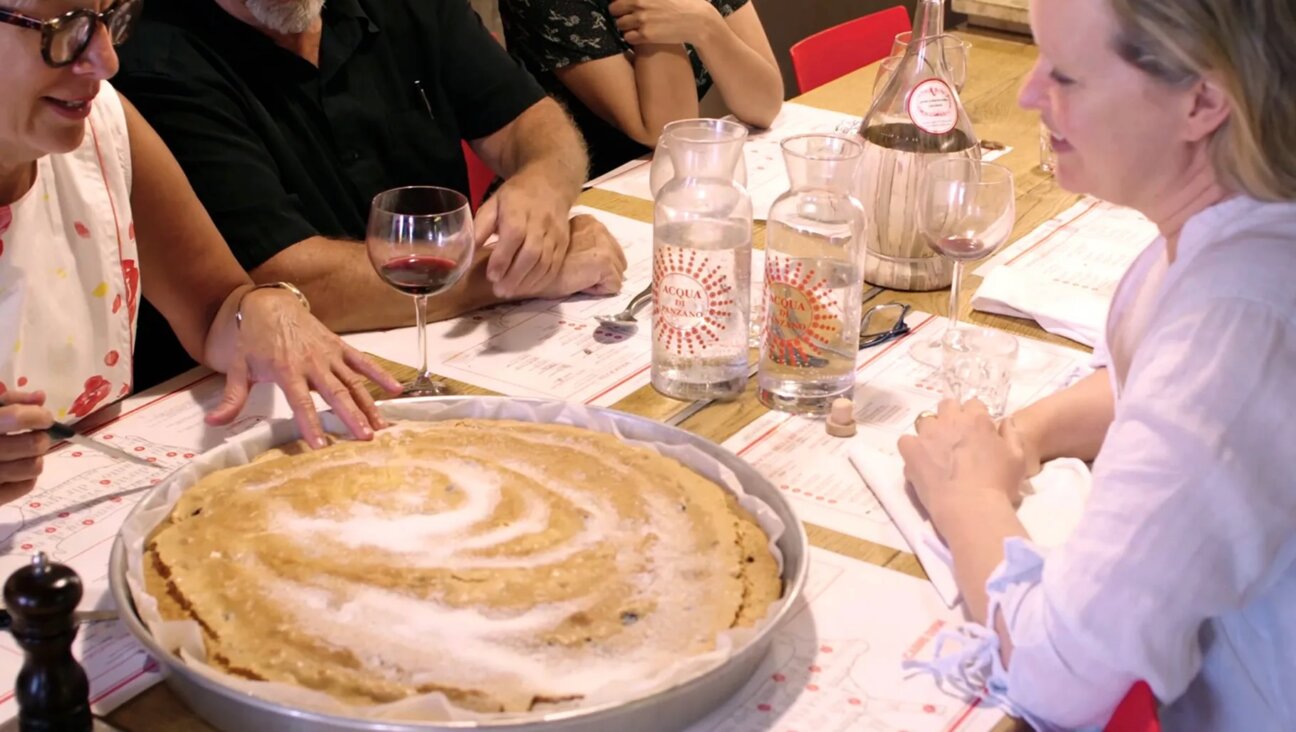Why Sachlav Is Really Israeli — and Arab Too
Photograph by Michael Kaminer.
Cultural appropriation is a white hot topic in today’s internet-rage culture. Sometimes, the rage is really important and other times it sort of misses the point.
Israel has gotten a lot of that beef from those who say it’s unfairly staked claims to foods that are really the cultural property of Arabs.
“Hummus is not Israeli! Falafel is not Israeli!” some say. That’s usually followed by some variation of: “Well, it figures. When Israel isn’t appropriating land, it’s appropriating food.”
I’ll leave the politics for another column. But when it comes to hummus, falafel and yes, even possibly sachlav, I will say they are Israeli.
They’re also Lebanese. And Syrian. And Palestinian.
They’re all of the above — and there is absolutely nothing wrong with saying that.
A blog post about sachlav that was published earlier today touched a serious nerve with cultural purists and Palestinian activists.
Not just Hummus! Did you know that traditional Ramadan drink of Sahlab has now become the “Israeli” drink “Sachlav”? http://t.co/vzJsqGJ33m
— Ali Abunimah (@AliAbunimah) February 5, 2015
Writer Michael Kaminer never said that sachlav originated in Israel, but simply called it an Israeli alternative to hot chocolate. (And as an Israeli I have to say, we still love our hot chocolate.) In a way, the sachlav variant of saleb or sahlab served in Israeli coffee shops is its own original Israeli variation of the drink.
As an Israeli, on “cold” winter days (anything chillier than 50 degrees qualifies!), I’ve often mixed hot milk with a packet of instant sachlav to warm me up (cue: real sahlav enthusiasts wince), or run to a cafe that serves a particularly delicious one. It is hearty, filling and comforting.
The starchy and sweet drink pre-dates British colonial borders that define the modern-day Middle East. It’s a drink that traveled with many to the countries that they live in now. It’s a drink that has its own specific variation in the different countries that host it.
Sachlav is the Hebrew word for orchid, yet sachlav is no longer made from its customary ground orchid tubers. Some argue that it originated in the Roman Empire and served as an aphrodisiac. But it may have originated in the 17th-century Ottoman empire and traveled around. It even had a British version, saloop, which supposedly “became obsolete after “it got about that it was a good remedy for venereal disease and so drinking it in public became shameful.”
Often times, when people cry out Israeli culinary appropriation, they forget about the existence of Arab Jews, many of whom were forced to leave their homelands after the founding of Israel in 1948. These Arab Jews brought with them a wealth of knowledge and their own cuisines, inextricably tied to the countries they just left.
Many still speak Arabic, Persian or Turkish. They are a vital part of Israel. And so is their food.
When I was discussing with a colleague the fact that the New York branches of the cafe Aroma sometimes serve sachlav, she was surprised to hear the chain was Israeli. “But they serve alfajores!” she exclaimed, referring to a popular South and Central American cookie, which originated in Spain. Yes, Israelis have also appropriated South and Central American food, not just Arab food. In fact, many of the foods we think of as typical of Ashkenazi Jewry are actually Polish or Ukrainian in origin.
I agree that exploring the historical background of our food is important. Food can bring us together.
Even reading the angry response to our latest sachlav piece made me realize that there are many places in the city that serve variations of sahlab, and I am eager to try these different restaurants (and, if you have any specific places to recommend, please post them in your comments).
The truth is, that rage about appropriating a food is often tied to rage about other things, be it more or less justified. The way to our hearts is often our stomaches, and in so many of our favorite foods we can find ways to connect with each other, ties to bind us to the most surprising places and people.
Maybe the best thing to say is that these food aren’t just Israeli, but, they’re Israeli as well as Arab. We can argue about many things. But one thing we’d be hard pressed to argue about is that, on a cold winter day, sachlav in its many forms, when prepared just right, is just about the most delicious, comforting thing you could drink. A cup of sachlav is so rich and filling, one may not feel the need for rage over the many things that may tear us apart.
A message from our Publisher & CEO Rachel Fishman Feddersen

I hope you appreciated this article. Before you go, I’d like to ask you to please support the Forward’s award-winning, nonprofit journalism so that we can be prepared for whatever news 2025 brings.
At a time when other newsrooms are closing or cutting back, the Forward has removed its paywall and invested additional resources to report on the ground from Israel and around the U.S. on the impact of the war, rising antisemitism and polarized discourse.
Readers like you make it all possible. Support our work by becoming a Forward Member and connect with our journalism and your community.
— Rachel Fishman Feddersen, Publisher and CEO
























